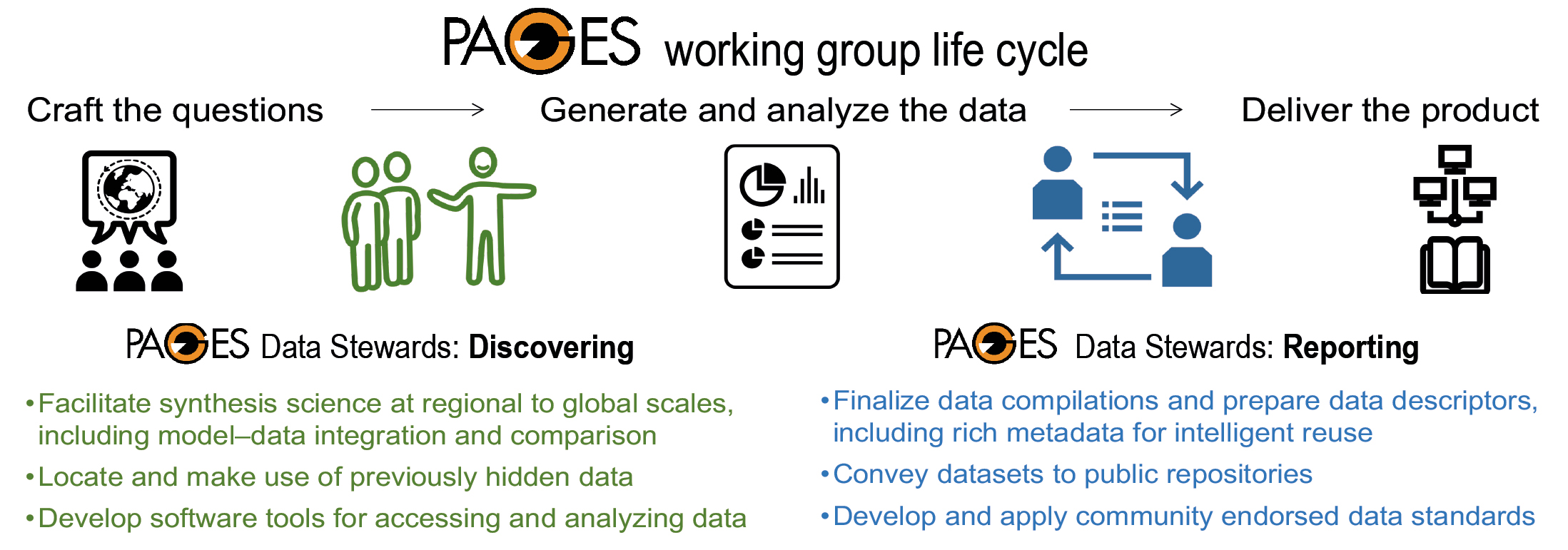- Home
- Publications
- PAGES Magazine
- Data Stewardship Projects Underway
Data stewardship projects underway
Kaufman DS
Past Global Changes Magazine
30(1)
62
2022
Eleven new PAGES-funded Data Stewards are helping PAGES working groups to discover, analyze, and curate community data resources.
Professional scientific organizations are playing an increasingly important role in motivating the cultural shift toward FAIR (Findable, Accessible, Interoperable, and Reusable) data practices (PAGES Scientific Steering Committee 2018). PAGES now offers its working groups financial support to help develop open data resources that facilitate high-impact global change research. The first nine PAGES Data Steward Scholarships are now underway. Stipends averaging USD 14,400, and ranging up to USD 20,000, recognize and reward early-career researchers and established specialists for their valued efforts to compile and curate data products for the long-term benefit of the global paleoscience community.
These data stewards are serving key roles in the life cycle of PAGES working groups, both in the data-discovery and data-reporting stages (Fig. 1). They are helping to accelerate the rate at which past-global-change data are entering the public domain. They are gathering the essential metadata needed for intelligent data reuse, and are formatting the datasets so they are amenable to analysis by open-source code. PAGES data stewards are implementing practices that model and promote FAIR data principles (Wilkinson et al. 2016), while making use of, and reducing loss of, valuable data (Kaufman and PAGES 2k special-issue editorial team 2018). Their contribution as curators of community data resources will extend well beyond the lifetime of a working group (Williams et al. 2018).
 |
|
Figure 1: Data stewards are supported financially by PAGES to serve key roles in the life cycle of PAGES working groups, both in the data-discovery and data-reporting stages. |
PAGES-funded data stewards are helping PAGES working groups to achieve their goals in a variety of ways. Specifically:
C-PEAT (Carbon in Peat on Earth through Time) held a series of "data-collection happy hours" to gather contributions of peat-based proxy records from around the world. The data and essential metadata are being standardized for use in ecosystem models to understand carbon and water cycling.
pastglobalchanges.org/c-peat/data
C-SIDE (Cycles of Sea-Ice Dynamics in the Earth system) has compiled a dataset of sea-ice records from the Southern Ocean over the last glacial-interglacial cycle and is preparing a data descriptor for publication.
pastglobalchanges.org/c-side/data
OC3 (Ocean Circulation and Carbon Cycling) is building on its World Atlas of late Quaternary foraminiferal oxygen and carbon isotopes by generating quality-controlled age models for the highest resolution records, with the goal of resolving rapid changes during the last deglacial transition.
pastglobalchanges.org/oc3/data
2k Network is assembling all existing 2k datasets, including those featuring paleo temperature, moisture and isotopic records of the Common Era, to improve their accessibility and interoperability. They plan to develop a one-stop portal that describes the datasets in multiple languages. Within the 2k Network, CoralHydro2k has added 41 seawater oxygen-isotope records to its data compilation. Nearly half of these were previously "hidden" behind paywalls and in grey literature. These data will help calibrate marine carbonate proxies and improve models of ocean-atmosphere interactions. CLIVASH2k's community-wide data call netted 110 new sodium and sulphate datasets from Antarctic ice cores. The data were received in various forms and are being compiled into a uniform format, while fleshing out missing metadata. The data will be used to reconstruct Antarctic atmospheric circulation and surface mass balance over the past 2000 years.
pastglobalchanges.org/2k/data
PALSEA (PALeo constraints on SEA level rise) is merging the recently published Holocene sea-level database with the existing world atlas of last interglacial sea-level indicators. The group is planning to improve the online database interface to help address questions about the drivers of sea-level change at local to global scales.
pastglobalchanges.org/palsea/data
PEOPLE 3000 (PalEOclimate and PeopLing of the Earth) is expanding its global compilation of archaeological radiocarbon data to support research on human paleodemography.
pastglobalchanges.org/people-3000/data
SISAL (Speleothem Isotope Synthesis and AnaLysis) is updating its well-established database to include speleothem trace-element time series. It plans to develop a computer app to enhance database accessibility. pastglobalchanges.org/sisal/data
Any member of a PAGES working group can apply for a Data Steward Scholarship. Contact your working group leaders. For more information see the PAGES website: pastglobalchanges.org/dss
affiliation
Northern Arizona University, Flagstaff, AZ, USA
contact
Darrell Kaufman: Darrell.Kaufman nau.edu
nau.edu
references
Kaufman DS, PAGES 2k special-issue editorial team (2018) Clim Past 14: 593-600
PAGES Scientific Steering Committee (2018) PAGES Mag 26: 48